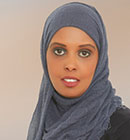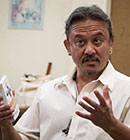| 9:00-9:10am
|
Emcee Introduction
- Adam Maurer | Sustainability Coordinator, Seattle Colleges
|
| 9:10-9:15am |
Land Acknowledgement
- Cecile Hansen | Chairperson, Duwamish Tribe
|
| 9:20-9:55am |
-
 Ubax Gardheere | Equitable Development Division Manager, City of Seattle Ubax Gardheere | Equitable Development Division Manager, City of Seattle
|
| 9:55-10:15am |
- Sustainability Round Table Update
- Toren Elste | Program Specialist, University of Washington Sustainability
- Claudia Frere-Anderson | Director, University of Washington Sustainability
- Adam Maurer | Sustainability Coordinator, Seattle Colleges
- Jenny McNamara | Sustainability Director, Portland State University
- Taylor McHolm, PhD | Program Director, Student Sustainability Center, University of Oregon
- Sarah Stoeckl, PhD | Program Manager, Office of Sustainability, University of Oregon
|
| 10:15-11:15am |
-
- Moderator: Sarah Stoeckl, PhD | Program Manager, Office of Sustainability, University of Oregon
- José González | Conservationist/Environmentalist, Chicano, and Educator
- Tim Jensen | Associate Professor and Director of Writing, School of Writing, Literature, and Film, Oregon State University
- Arianne True | Poet and Teaching Artist, Seattle
|
| 11:15-11:30am |
Break
|
| 11:30am-12:30pm |
-
- Toren Elste | Program Specialist, University of Washington Sustainability
- Kathleen Klaniecki | Sustainability Coordinator, Central Washington University
- Alexa Russo | Sustainability Coordinator, University of Washington Bothell
- Amber Nicholson | Director of Sustainability, Bellevue College
|
-
- Heather Price | Chemistry Faculty, North Seattle College
- Sonya Doucette | Chemistry Faculty, Bellevue College
|
-
- Kaede Kawauchi | Program Manager, Intentional Endowments Network
- Jochebed Bogunjoko | Founder & Racial Equity Strategist, J Aduke Consulting
- Ryan Taylor | Project Coordinator, ASU Enterprise Partners
- Wesley Lauer, PhD, PE | Professor of Civil & Environmental Engineering, Seattle University
- Valentina Zamora, PhD | Associate Professor, Accounting, Seattle University
|
-
- Philip Garrison | Founder and President, APOYO Food Bank
- Stefanie Wickstrom | Executive Director, APOYO Food Bank; and Faculty, Central Washington University
- Susan Kaspari | Professor, Department of Geological Sciences, Central Washington University
- Hope Amason | Faculty, Central Washington University
|
| 12:30-1:00pm |
Lunch Break
|
| 1:00-2:00pm |
-
- Robyn Hathcock | Program Manager, University of Oregon, Office of Sustainability
- Kshamta Hunter | Sustainability Student Engagement Manager, UBC Sustainable Initiative, University of British Columbia, Canada
- Abbie Little | Community Relations Coordinator - Experiential Learning, Academic Sustainability Programs Office, McMaster University, Canada
Sponsored by:

|
-
- Meghan Jones | Seattle Director, Factory Farming Awareness Coalition
- Taylor McKenzie | Third Year Student, Seattle University
|
-
- Emily Nielsen | Sustainable Student Action Member, Seattle University
- Keira Cruickshank | Sustainable Student Action Member, Seattle University
|
-
- Rob Hemphill | Sustainability Data Analyst, Portland State University
- Amanda Wolf | Program Analyst, Portland State University
|
| 2:00-2:30pm |
Break
|
| 2:00-2:30pm |
Poster Sessions
|
| 2:35-3:10pm |
-
 Ananda Lee Tan | Director, Shaping Change Collaborative Ananda Lee Tan | Director, Shaping Change Collaborative
|
| 3:10-3:15pm |
Break
|
| 3:15-4:00pm |
-
- Steve Abercrombie | Sustainable Building Science Technology Faculty, South Seattle College
|
-
- Paige Williams | Student, Equity and Inclusion Student Advisory Committee, Cascadia College
- Deja Brown | Student, Equity and Inclusion Student Advisory Committee, Cascadia College
- Stephan Masao Classen | Assistant Director of Sustainable Practices, Cascadia College
|
-
- Sarah Fenton | Student Body President Advisor, North Seattle College
- Lily Butler | Student, Oregon State University
|
-
|
| 4:00-4:10pm |
Transition Break, grab a beverage and get cozy!
|
| 4:10-5:00pm |
-
|
| 8:30-8:35am |
Emcee Intro & Announcements
- Adam Maurer | Sustainability Coordinator, Seattle Colleges
|
8:35-9:05am
 |
-
- Holly Braun | Energy Innovation and Policy Manager, NW Natural
- Hal Nelson | Associate Professor, Portland State University
|
| 9:10-10:10am |
-
- Moderator: Taylor McHolm, PhD | Program Director, Student Sustainability Center, University of Oregon
- Sarah Jaquette Ray, PhD | Associate Professor and Chair of Environmental Studies, Humboldt State University and author of A Field Guide to Climate Anxiety: How to Keep Your Cool on a Warming Planet (2020)
- Jennifer Atkinson, PhD | Associate Professor of Environmental Studies, University of Washington Bothell
- LaUra Schmidt | Founding Director, Good Grief Network
- Jenna Truong | Student, University of Washington
|
| 10:10-10:30am |
Yoga Break
- Molly Spangler | Yoga Instructor
|
| 10:30-11:30am |
-
- Briar Schoon | Sustainability Manager, Portland Community College
- Stephania Fregosi | Sustainability Analyst, Portland Community College
- Claudia Frere-Anderson | Director, University of Washington Sustainability
- Christoph Strouse | Grad student and project coordinator, UW Sustainability Plan
|
-
- Heather Burns, EdD. | Associate Professor, Portland State University, Leadership for Sustainability Education Master's Program
- Laura Steffen, MBA, CPC, ELI-MP | Life Coach
|
-
- Pavlina McGrady | Assistant Professor, Southern Oregon University
- E. Jamie Trammell | Associate Professor of Environmental Science and Policy, Southern Oregon University
|
-
- Fotima Ibrokhim | Outreach Coordinator, University of Washington Seattle
- Yahia Ali | Project Development Specialist, University of Washington
|
| 11:30am-12:00pm |
- Lunch Break
|
| 12:00-1:00pm |
-
- Andrea Norris | Marketing & Development Coordinator, Materials Management, Oregon State University
- Emily Faltesek | Food Security Programs Coordinator, Human Services Resource Center, Oregon State University
- Miya Konishi | Bearcat Pantry Coordinator, SOAR Center, Willamette University
- Jill Anne Smedstad | Environmental and Community Engagement Coordinator, Student Sustainability Center, Southern Oregon University
|
-
- Brian Stern | Regional Energy Director, Glumac
- Rachel Wong | Associate University Engineer, California State University
- Steve Mital | Sustainability Director, University of Oregon
- Lyle Keck | Building Performance Engineer, Affiliated Engineers, Inc.
|
-
- Darryl Harris | Student, South Seattle College
- Tiare Gill | Graduate Student, Antioch University Seattle; Community Growth and Impact Manager, City Fruit
- Kevin Gibson | SBST SR, Hermanson Service Department Foreman
- Steven Vasquez | Student, South Seattle College
|
-
- Ronnie Eder | Marketing & Communications Manager, PIPs Rewards
- Ryan Maikell | Student, UCCS
- Maya McClendon | Founder, TimeOut App
|
| 1:00-1:45pm |
Break
|
| 1:05-1:35pm |
Structured Networking
|
| 1:45-3:30pm |
-
- D'Andre Fisher, M.Ed. | Associate Vice President, Equity, Diversity and Inclusion, North Seattle College
- Sarah Sense Wilson | Chair, Urban Native Education Alliance
- Cante Remle | 13 year old Lakota youth
- Chayton Remle | 16 year old Lakota youth
- Tim Shay | 16 year old Yakama youth
- Akichita (AK) Taken Alive | 19 year old Standing Rock Lakota youth
- Issac Hochberg | 18 year old Assiniboine Sioux youth
|
 Ubax Gardheere | Equitable Development Division Manager, City of Seattle
Ubax Gardheere | Equitable Development Division Manager, City of Seattle
 Ananda Lee Tan | Director, Shaping Change Collaborative
Ananda Lee Tan | Director, Shaping Change Collaborative

 © 2026 | Event by Social Enterprises, Inc.
© 2026 | Event by Social Enterprises, Inc.
